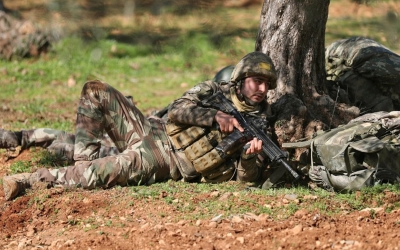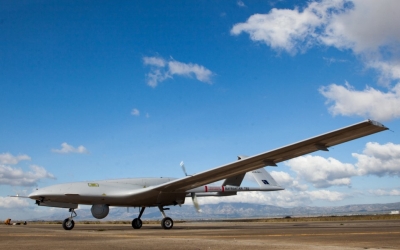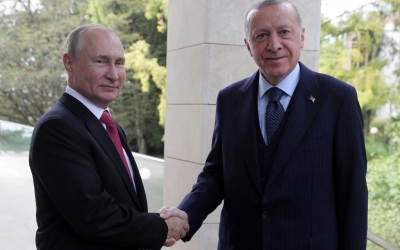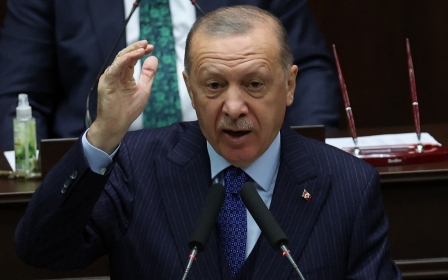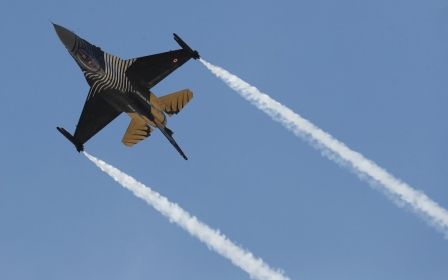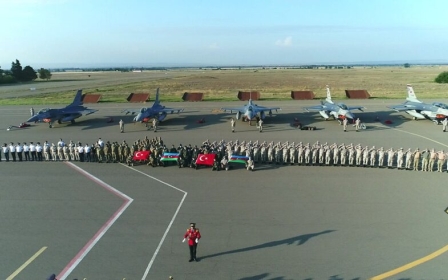Turkey's F-16 request a test of US relationship
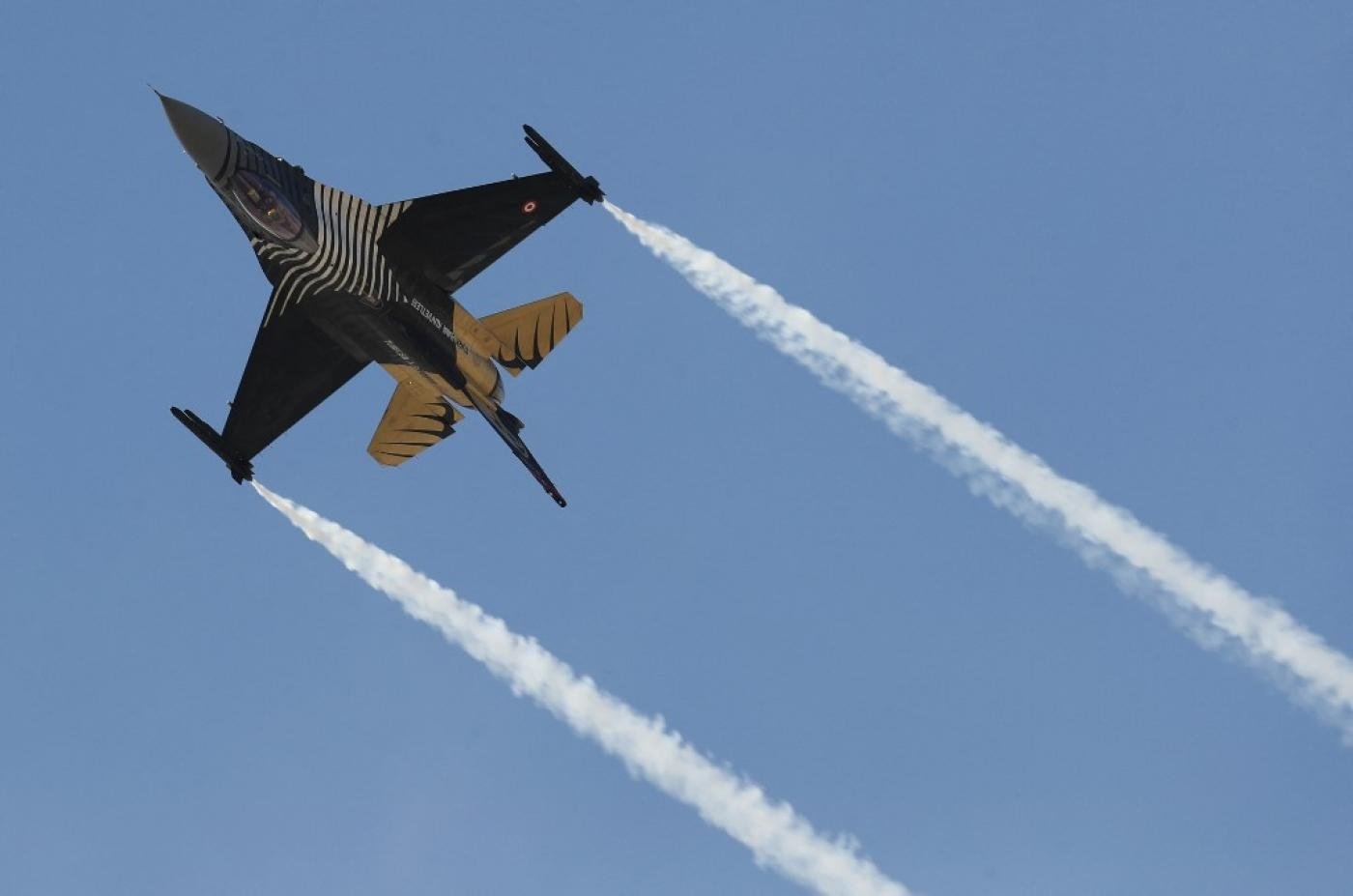
Turkish President Recep Tayyip Erdogan says he plans to directly ask US President Joe Biden about the status of Ankara's request to purchase F-16 fighter jets.
"I will ask: 'What are we doing, what is going on?' We will not allow Turkey's rights to be breached in any way," when the two meet at a G-20 gathering in Rome next week, the Turkish leader told journalists on a flight returning from an official visit to West Africa.
Turkey informed Washington last month that it wanted to purchase 40 new F-16s and 80 modernisation kits for its existing fleet of aircraft.
'Erdogan is looking for something prestigious. And resisting the US is seen in Ankara as good for the image of the president'
- Marc Pierini, former EU ambassador to Turkey
The two nations, allies in Nato though with a relationship fraught with tensions, have already disagreed on who initiated the process, with Erdogan saying the US encouraged Ankara to make the proposal as a form of recompense for its payment of $1.4bn to acquire F-35 fighter jets.
Ankara had ordered more than 100 F-35s from the US, but was removed from the programme in 2019 after it acquired Russian S-400 missile defence systems. Its defence industry was subsequently sanctioned by the US in December 2020.
New MEE newsletter: Jerusalem Dispatch
Sign up to get the latest insights and analysis on Israel-Palestine, alongside Turkey Unpacked and other MEE newsletters
The State Department says it has not made any financing offers to Turkey for the deal and has yet to make any formal or informal notifications to Congress concerning the sale.
In recent weeks the Turkish leader has sought to build up the potential meeting with Biden as a way for the two leaders to hammer out differences over the sale. The White House has yet to confirm if it will take place.
On Thursday Erdogan told reporters: "We will get this $1.4 billion of ours one way or another," adding, "I believe we will make progress [in Rome]."
Marc Pierini, a former European Union ambassador to Turkey and a visiting scholar at Carnegie Europe, said the meeting with Biden was important for Erdogan, who is dealing with a severe economic crisis at home and falling poll numbers.
"Erdogan is looking for something prestigious," he said. "And resisting the US is seen in Ankara as good for the image of the president."
Reaching an agreement with the Biden administration is only one part of process, however, as the sale can also be blocked by Congress, which has grown increasingly negative towards Turkey in recent years.
On Friday a group of bipartisan lawmakers led by Republican Gus Bilirakis and Democrats Chris Pappas and Carolyn Maloni circulated a letter on Capitol Hill urging the US State Department to oppose both the sale and upgrade of F-16s to Turkey.
"We believe that the wide media coverage of Turkey's request, as well as the statements made by President Erdogan himself, provide us with a sufficient basis to state our opposition to this possible sale," the letter stated.
Those sentiments appeared to reinforce comments made last month by Democratic Senator Robert Menendez, chairman of the powerful Senate Foreign Relations Committee, who stated: "From my point of view, I do not see any new sales of [US] weapons systems in Turkey, unless there is a dramatic change in the conduct of the S-400s."
A credible ally?
Facing stiff resistance to the sale on Capitol Hill, Turkey's request to purchase the F-16s is emerging as a bellwether of its increasingly fraught relationship with Washington.
So far, the Biden administration's attitude towards Turkey has been interpreted as lukewarm at best. It appointed well-known Turkey-hawk Brett McGurk as its top representative to the campaign to defeat the Islamic State group and has brushed off Erdogan's past suggestions of a meeting.
'We already have F-16s of all different models in our air force existing with the S-400. If they reject this request it will be seen as totally political'
- Murat Aslan, former Turkish military intelligence official
The US also just renewed a long-standing defence agreement with Greece, Turkey's long-time rival in the eastern Mediterranean, allowing it to extend its military presence there at a time when some suggest Greece might serve as an alternative to having US bases in Turkey.
"If the F-16 request is refused, it will be proof that the relationship is not in a good place," Rachel Ellehuus, deputy director of the Center for Strategic and International Studies' Europe, Russia, and Eurasia Program, told Middle East Eye.
"It would appear that we [the US] won't even sell the Turks what they already have in their inventory," Ellehuus said. "Erdogan is almost trying to call the US government's bluff by making this request."
Turkey has around 250 F-16s, which it began purchasing in the 1980s when it was a US Cold War ally, making it the world's third-largest operator of the fighter jet, behind only the US and Israel.
In their letter on Friday, US lawmakers cited Turkey's ejection from the F-35 programme over concerns its technology was jeopardised by possession of the Russian S-400 system as grounds enough to also block any deal on the the F-16s.
"Experts note that the upgrade to Block 70 [F-16s] poses similar risks if Ankara continues to own Russian S-400s. Given that upgraded F-16s continue to play an important role for both us and our credible allies, this is a risk that we find unacceptable," they stated.
Many in Ankara bristle at this suggestion and are keen to point out that Turkey is actively deploying their F-16s in Nato drills.
In September, Turkey sent four of its F-16s to participate in joint Nato policing missions in Poland. Over the summer, its pilots conducted drills with its alliance partners in the Black Sea, a region which has become a hotspot in the rivalry with Russia and where Turkey has called for a stronger Nato presence.
"There is no reason to reject the F-16 request," Murat Aslan, a former military intelligence professional who has held various roles in Turkey's defence ministry, told Middle East Eye.
"We already have F-16's of all different models in our air force existing with the S-400. If they reject this request it will be seen as totally political," he added.
Lagging behind
Turkey's decision to purchase the S-400 is widely viewed as handing Moscow a victory against Nato along its southern flank, but troubles in the US-Turkish relationship go beyond that.
Ankara has been more willing to independently use military force in regional conflicts such as Libya, Nagorno-Karabakh, and Syria, irking many in Washington.
There is also concern over Turkey's support for the Muslim Brotherhood, its fraught relations with Israel, and actions in the eastern Mediterranean.
For Turkey, a major complaint has been what it believes to be a lack of commitment from Nato allies in its fight against Kurdish militants, namely the PKK.
While both Ankara and the US consider the group a terrorist organisation, the US has supported its Syrian counterpart, the YPG, as part of its campaign to defeat the Islamic State group, a move that has long frustrated Turkey.
Further complicating hopes for an F-16 deal, Erdogan recently promised to step up the country's campaign against the YPG, after two of Ankara's soldiers were killed in an attack by the group in northern Syria.
"Nobody on Capitol Hill, from across the political aisle, really supports Turkey anymore, and that is what makes this F-16 purchase so difficult," Ellehuus said.
Arda Mevlutoglu, a well-known professional in Turkey's defence industry, said, regardless of talk about Turkey trying to recoup its stalled F-35 investment, Ankara was bound to make this request.
"It shouldn't surprise anyone," he told Middle East Eye. "An upgrade has been in the works for a while as the F-16 makes up the backbone of Turkey's air force."
Turkey's neighbours have also been adding to their arsenal. Greece has agreed to purchase new French Rafale fighter jets and is upgrading its own F-16s, while Israel has been adding to its fleet of F-35s, and the UAE is on track with its plans to purchase the fifth-generation fighter jet.
"Regional powers are investing heavily in their air forces and Turkey faces the risk of lagging behind, making this request even more important," Mevlutoglu said.
Russian jets, an empty threat?
Erdogan has said Turkey is willing to pursue other options if the deal with Washington is blocked, with the head of Turkey's defence industry saying the country was open to buying Russian aircraft.
However, many observers have said Ankara would likely be reluctant to go ahead with such a purchase.
Pierini called it Turkey's "least best option," and said Erdogan was under pressure from Russia's President Vladimir Putin to increase arms procurements from Moscow as he tries to navigate security concerns along his country's border with Syria.
Mevlutoglu said acquiring jets from Russia, or even from a Nato country such as the UK, would be a massive undertaking for Turkey and require complicated retooling efforts.
"It would mean reconfiguring the entire Turkish air force from scratch. You can't just purchase fighter jets. Everything from logistics and training, even down to bullets, would need to be changed," he said.
But Aslan said that if Turkey's request were turned down it may be a cost the country is willing to bear: "Russia will be able to impose their political will even more. That is why Turkey is inclined to the F-16s, but buying another aircraft is an option."
Some have floated the idea of Turkey obtaining upgrade kits for its older aircraft, rather than purchasing newer jets, as a more palatable option for Congress.
Ellehuus said this was one "compromise option," adding, "some of the jets need upgrades and some don't, but if they are moved out of the F-16 programme altogether, it would really hurt them".
Mevlutoglu said one outcome of the uncertainty around the deal has been to boost Turkey's goal of domestically producing its own fighter jet.
"National defence production is a priority for every political group in Turkey, and the F-16 issue only reinforces it," he said.
Turkey's TF/X fighter jet programme has hit roadblocks, including sourcing component parts and an engine, but Ankara claims a prototype will be ready by 2023, the centennial anniversary of modern Turkey's founding. It plans to deploy the jet in the early 2030s.
"Turkey doesn't want to be dependent on foreign assistance to provide security," Aslan concluded.
Middle East Eye delivers independent and unrivalled coverage and analysis of the Middle East, North Africa and beyond. To learn more about republishing this content and the associated fees, please fill out this form. More about MEE can be found here.


